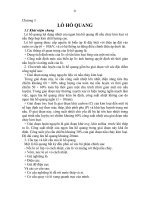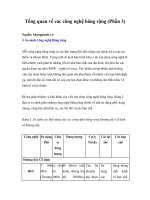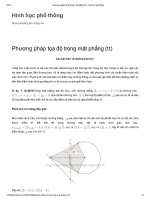Examples of VHDL Descriptions phần 3 pdf
Bạn đang xem bản rút gọn của tài liệu. Xem và tải ngay bản đầy đủ của tài liệu tại đây (39.65 KB, 10 trang )
Examples of VHDL Descriptions
clock <= '0', '1' after 50 ms;
wait for 100 ms;
end process;
test inputs
process begin
pedestrian <= '0';
reset <= '1';
wait for 300 ms;
reset <= '0';
wait for 40000 ms;
pedestrian <= '1';
wait for 200 ms;
pedestrian <= '0';
wait;
end process;
pelican : pelcross port map (clock, reset, pedestrian,
red, amber, green);
end v1;
Simple Microprocessor System
● Package Defining the Instruction Set of the CPU
● Third Party Package containing functions for Bit_Vector operations
● Behavioural model of a 256-word, 8-bit Read Only Memory
● Behavioural model of a 16-word, 8-bit Random Access Memory
● Behavioural model of a simple 8-bit CPU
● Structural description of a microprocessor system using the above components
Package Defining the Instruction Set of the CPU
PACKAGE cpu8pac IS
defining instruction set
instruction format
7 4|3 0|7 0
opcode|page|[page offset]
instructions which need an address are two bytes
long all others are single byte
CONSTANT lda : BIT_VECTOR(3 DOWNTO 0) := "0001";
CONSTANT ldb : BIT_VECTOR(3 DOWNTO 0) := "0010";
CONSTANT sta : BIT_VECTOR(3 DOWNTO 0) := "0011";
CONSTANT stb : BIT_VECTOR(3 DOWNTO 0) := "0000";
CONSTANT jmp : BIT_VECTOR(3 DOWNTO 0) := "0100";
CONSTANT add : BIT_VECTOR(3 DOWNTO 0) := "0101";
CONSTANT subr : BIT_VECTOR(3 DOWNTO 0) := "0110";
CONSTANT inc : BIT_VECTOR(3 DOWNTO 0) := "0111";
CONSTANT dec : BIT_VECTOR(3 DOWNTO 0) := "1000";
CONSTANT land : BIT_VECTOR(3 DOWNTO 0) := "1001";
CONSTANT lor : BIT_VECTOR(3 DOWNTO 0) := "1010";
CONSTANT cmp : BIT_VECTOR(3 DOWNTO 0) := "1011";
CONSTANT lxor : BIT_VECTOR(3 DOWNTO 0) := "1100";
CONSTANT lita : BIT_VECTOR(3 DOWNTO 0) := "1101";
CONSTANT litb : BIT_VECTOR(3 DOWNTO 0) := "1110";
CONSTANT clra : BIT_VECTOR(3 DOWNTO 0) := "1111";
END cpu8pac;
Third Party Package containing functions for Bit_Vector operations
http://www.ami.bolton.ac.uk/courseware/adveda/vhdl/vhdlexmp.html (21 of 67) [23/1/2002 4:15:09 ]
Examples of VHDL Descriptions
Cypress Semiconductor WARP 2.0
Copyright Cypress Semiconductor Corporation, 1994
as an unpublished work.
$Id: libbv.vhd,v 1.4 1994/12/15 18:35:28 hemmert Exp $
package bv_math
Bit Vector support package:
Contains these functions:
The output length of the function is the same as the input length.
inc_bv - increment a bit vector. If function is assigned
to a signal within a clocked process, the result
will be an up counter. Will require one macrocell
for each bit.
dec_bv - decrement a bit vector. If function is assigned
to a signal within a clocked process, the result
will be a down counter. Will require one macrocell
for each bit.
"+" - regular addition function for two bit vectors.
"+" operator overloads the existing "+" operator
definition for arithmetic operations on integers.
Will require one macrocell for each bit. The output
is the same size as the input so there is no carry output.
If a carry out is required, the user should increase the
size of the input bit_vectors and use the MSB as the
carry bit. There is also no separate carry-in.
"-" - regular subtraction function for two bit vectors.
"-" operator overloads the existing "-" operator
definition for arithmetic operations on integers.
inv - unary invert for use in port maps and sequential
assignments. Overloaded for bit_vectors.
PACKAGE bv_math IS
FUNCTION inc_bv (a : BIT_VECTOR) RETURN BIT_VECTOR;
FUNCTION dec_bv (a : BIT_VECTOR) RETURN BIT_VECTOR;
FUNCTION "+" (a, b : BIT_VECTOR) RETURN BIT_VECTOR;
FUNCTION "+" (a : BIT_VECTOR; b : BIT) RETURN BIT_VECTOR;
FUNCTION "-" (a, b : BIT_VECTOR) RETURN BIT_VECTOR;
FUNCTION "-" (a : BIT_VECTOR; b : BIT) RETURN BIT_VECTOR;
FUNCTION inv (a : BIT) RETURN BIT;
FUNCTION inv (a : BIT_VECTOR) RETURN BIT_VECTOR;
END bv_math;
PACKAGE BODY bv_math IS
inc_bv
Increment Bit vector.
In: bit_vector.
Return: bit_vector.
FUNCTION inc_bv(a : BIT_VECTOR)RETURN BIT_VECTOR IS
VARIABLE s : BIT_VECTOR (a'RANGE);
VARIABLE carry : BIT;
BEGIN
carry := '1';
FOR i IN a'LOW TO a'HIGH LOOP
s(i) := a(i) XOR carry;
carry := a(i) AND carry;
http://www.ami.bolton.ac.uk/courseware/adveda/vhdl/vhdlexmp.html (22 of 67) [23/1/2002 4:15:09 ]
Examples of VHDL Descriptions
END LOOP;
RETURN (s);
END inc_bv;
"+"
Add overload for:
In: two bit_vectors.
Return: bit_vector.
FUNCTION "+"(a, b : BIT_VECTOR)RETURN BIT_VECTOR IS
VARIABLE s : BIT_VECTOR (a'RANGE);
VARIABLE carry : BIT;
VARIABLE bi : integer; Indexes b.
BEGIN
ASSERT a'LENGTH <= 8 REPORT
"Addition OF vectors OF LENGTH > 8 may take exponential TIME."
SEVERITY WARNING;
carry := '0';
FOR i IN a'LOW TO a'HIGH LOOP
bi := b'low + (i - a'low);
s(i) := (a(i) XOR b(bi)) XOR carry;
carry := ((a(i) OR b(bi)) AND carry) OR (a(i) AND b(bi));
END LOOP;
RETURN (s);
END "+"; Two bit_vectors.
"+"
Add overload for:
In: bit_vector and bit.
Return bit_vector.
FUNCTION "+"(a : BIT_VECTOR; b : BIT)RETURN BIT_VECTOR IS
VARIABLE s : BIT_VECTOR (a'RANGE);
VARIABLE carry : BIT;
BEGIN
carry := b;
FOR i IN a'LOW TO a'HIGH LOOP
s(i) := a(i) XOR carry;
carry := a(i) AND carry;
END LOOP;
RETURN (s);
END "+"; Bit_vector and bit.
dec_bv
Decrement Bit Vector
In: bit_vector.
Return: bit_vector.
FUNCTION dec_bv(a : BIT_VECTOR) RETURN BIT_VECTOR IS
VARIABLE s : BIT_VECTOR (a'RANGE);
VARIABLE borrow : BIT;
BEGIN
borrow := '1';
FOR i IN a'LOW TO a'HIGH LOOP
s(i) := a(i) XOR borrow;
borrow := NOT (a(i)) AND borrow;
END LOOP;
RETURN (s);
END dec_bv;
"-"
Subtract overload for:
http://www.ami.bolton.ac.uk/courseware/adveda/vhdl/vhdlexmp.html (23 of 67) [23/1/2002 4:15:09 ]
Examples of VHDL Descriptions
In: two bit_vectors.
Return: bit_vector.
FUNCTION "-"(a,b : BIT_VECTOR) RETURN BIT_VECTOR IS
VARIABLE s : BIT_VECTOR (a'RANGE);
VARIABLE borrow : BIT;
VARIABLE bi : integer; Indexes b.
BEGIN
ASSERT a'LENGTH <= 8 REPORT
"Subtraction OF vectors OF LENGTH > 8 may take exponential TIME."
SEVERITY WARNING;
borrow := '0';
FOR i IN a'LOW TO a'HIGH LOOP
bi := b'low + (i - a'low);
s(i) := (a(i) XOR b(bi)) XOR borrow;
borrow := (
(NOT (a(i)) AND borrow)
OR (b(bi) AND borrow)
OR (NOT (a(i)) AND b(bi))
);
END LOOP;
RETURN (s);
END "-"; two bit_vectors
"-"
Subtract overload for:
In: bit_vector, take away bit.
Return: bit_vector.
FUNCTION "-" (a : BIT_VECTOR; b : BIT) RETURN BIT_VECTOR IS
VARIABLE s : BIT_VECTOR (a'RANGE);
VARIABLE borrow : BIT;
BEGIN
borrow := b;
FOR i IN a'LOW TO a'HIGH LOOP
s(i) := a(i) XOR borrow;
borrow := (NOT(a(i)) AND borrow);
END LOOP;
RETURN (s);
END "-";
inv
Invert bit.
FUNCTION inv (a : BIT) RETURN BIT IS
VARIABLE result : BIT;
BEGIN
result := NOT(a);
RETURN (result);
END inv; Invert bit.
inv
Invert bet_vector.
FUNCTION inv (a : BIT_VECTOR) RETURN BIT_VECTOR IS
VARIABLE result : BIT_VECTOR (a'RANGE);
BEGIN
FOR i IN a'RANGE LOOP
result(i) := NOT(a(i));
END LOOP;
RETURN (result);
END inv; Invert bit_vector.
http://www.ami.bolton.ac.uk/courseware/adveda/vhdl/vhdlexmp.html (24 of 67) [23/1/2002 4:15:09 ]
Examples of VHDL Descriptions
END bv_math;
Behavioural model of a 256-word, 8-bit Read Only Memory
LIBRARY ieee;
USE ieee.std_logic_1164.ALL;
USE work.cpu8pac.ALL;
ENTITY rom256x8 IS
PORT(address : IN STD_LOGIC_VECTOR(7 DOWNTO 0);
csbar, oebar : IN STD_LOGIC;
data : OUT STD_LOGIC_VECTOR(7 DOWNTO 0));
END rom256x8;
version 1 loads acca and accb from locations 254 and 256
and exclusive or's the values and jumps back to repeat
ARCHITECTURE version1 OF rom256x8 IS
TYPE rom_array IS ARRAY (0 TO 255) OF BIT_VECTOR(7 DOWNTO 0);
CONSTANT rom_values : rom_array :=
(0 => clra & X"0",
1 => lda & X"0", lda $FE
2 => X"fe",
3 => ldb & X"0", ldb $FF
4 => X"ff",
5 => lxor & X"0", lxor
6 => jmp & X"0", jmp $001
7 => X"01",
254 => X"aa",
255 => X"55",
OTHERS => X"00");
BEGIN
PROCESS(address, csbar, oebar)
VARIABLE index : INTEGER := 0;
BEGIN
IF (csbar = '1' OR oebar = '1')
THEN data <= "ZZZZZZZZ";
ELSE
calculate address as an integer
index := 0;
FOR i IN address'RANGE LOOP
IF address(i) = '1' THEN
index := index + 2**i;
END IF;
END LOOP;
assign to output data lines
data <= To_StdlogicVector(rom_values(index));
END IF;
END PROCESS;
END version1;
version2 increments a location in the ram
ARCHITECTURE version2 OF rom256x8 IS
TYPE rom_array IS ARRAY (0 TO 255) OF BIT_VECTOR(7 DOWNTO 0);
CONSTANT rom_values : rom_array :=
(0 => clra & X"0",
1 => sta & X"1", sta $100
2 => X"00",
3 => lda & X"1", lda $100
4 => X"00",
5 => inc & X"0", inc a
6 => jmp & X"0", jmp $001
7 => X"01",
OTHERS => X"00");
BEGIN
http://www.ami.bolton.ac.uk/courseware/adveda/vhdl/vhdlexmp.html (25 of 67) [23/1/2002 4:15:09 ]
Examples of VHDL Descriptions
PROCESS(address, csbar, oebar)
VARIABLE index : INTEGER := 0;
BEGIN
IF (csbar = '1' OR oebar = '1')
THEN data <= "ZZZZZZZZ";
ELSE
calculate address as an integer
index := 0;
FOR i IN address'RANGE LOOP
IF address(i) = '1' THEN
index := index + 2**i;
END IF;
END LOOP;
assign to output data lines
data <= To_StdlogicVector(rom_values(index));
END IF;
END PROCESS;
END version2;
Behavioural model of a 16-word, 8-bit Random Access Memory
LIBRARY ieee;
USE ieee.std_logic_1164.ALL;
ENTITY ram16x8 IS
PORT(address : IN STD_LOGIC_VECTOR(3 DOWNTO 0);
csbar, oebar, webar : IN STD_LOGIC;
data : INOUT STD_LOGIC_VECTOR(7 DOWNTO 0));
END ram16x8;
ARCHITECTURE version1 OF ram16x8 IS
BEGIN
PROCESS(address, csbar, oebar, webar, data)
TYPE ram_array IS ARRAY (0 TO 15) OF BIT_VECTOR(7 DOWNTO 0);
VARIABLE index : INTEGER := 0;
VARIABLE ram_store : ram_array;
BEGIN
IF csbar = '0' THEN
calculate address as an integer
index := 0;
FOR i IN address'RANGE LOOP
IF address(i) = '1' THEN
index := index + 2**i;
END IF;
END LOOP;
IF rising_edge(webar) THEN
write to ram on rising edge of write pulse
ram_store(index) := To_bitvector(data);
ELSIF oebar = '0' THEN
data <= To_StdlogicVector(ram_store(index));
ELSE
data <= "ZZZZZZZZ";
END IF;
ELSE
data <= "ZZZZZZZZ";
END IF;
END PROCESS;
http://www.ami.bolton.ac.uk/courseware/adveda/vhdl/vhdlexmp.html (26 of 67) [23/1/2002 4:15:09 ]
Examples of VHDL Descriptions
END version1;
Behavioural model of a simple 8-bit CPU
LIBRARY ieee;
USE ieee.std_logic_1164.ALL;
USE work.bv_math.ALL;
USE work.cpu8pac.ALL;
ENTITY cpu IS
GENERIC(cycle_time : TIME := 200 ns); must be divisible by 8
PORT(reset : IN std_logic;
memrd, memwr : OUT std_logic;
address : OUT std_logic_vector(11 DOWNTO 0);
data : INOUT std_logic_vector(7 DOWNTO 0));
END cpu;
ARCHITECTURE version1 OF cpu IS
internal clock signal
SIGNAL clock : std_logic;
BEGIN
clock_gen : PROCESS
BEGIN
clock <= '1','0' AFTER cycle_time/2;
WAIT FOR cycle_time;
END PROCESS;
main_sequence : PROCESS
VARIABLE inst_reg : BIT_VECTOR(3 DOWNTO 0);
VARIABLE mar : BIT_VECTOR(11 DOWNTO 0);
VARIABLE acca, accb : BIT_VECTOR(7 DOWNTO 0);
VARIABLE pc : BIT_VECTOR(11 DOWNTO 0);
BEGIN
IF reset = '1' THEN
initialisation
memrd <= '1';
memwr <= '1';
pc := (OTHERS => '0');
address <= (OTHERS => 'Z');
data <= (OTHERS => 'Z');
WAIT UNTIL rising_edge(clock);
ELSE
fetch phase
address <= To_StdlogicVector(pc);
WAIT FOR cycle_time/4;
memrd <= '0';
WAIT FOR cycle_time/2;
memrd <= '1';
read instruction
inst_reg := To_bitvector(data(7 DOWNTO 4));
load page address
mar(11 DOWNTO 8) := To_bitvector(data(3 DOWNTO 0));
increment program counter
pc := inc_bv(pc);
wait until end of cycle
WAIT UNTIL rising_edge(clock);
execute
CASE inst_reg IS
WHEN add =>
add and sub use overloaded functions from bv_math package
http://www.ami.bolton.ac.uk/courseware/adveda/vhdl/vhdlexmp.html (27 of 67) [23/1/2002 4:15:09 ]
Examples of VHDL Descriptions
acca := acca + accb;
WHEN subr =>
acca := acca - accb;
WHEN inc =>
acca := inc_bv(acca);
WHEN dec =>
acca := dec_bv(acca);
WHEN land =>
acca := acca AND accb;
WHEN lor =>
acca := acca OR accb;
WHEN cmp =>
acca := NOT acca;
WHEN lxor =>
acca := acca XOR accb;
WHEN lita =>
acca := acca;
WHEN litb =>
acca := accb;
WHEN clra =>
acca := (OTHERS => '0');
WHEN lda|ldb|sta|stb =>
address <= To_StdlogicVector(pc);
WAIT FOR cycle_time/4;
memrd <= '0';
WAIT FOR cycle_time/2;
memrd <= '1';
read page offset address
mar(7 DOWNTO 0) := To_bitvector(data);
increment program counter
pc := inc_bv(pc);
wait until end of cycle
WAIT UNTIL rising_edge(clock);
output address of operand
address <= To_StdlogicVector(mar);
IF ((inst_reg = lda) OR (inst_reg = ldb)) THEN
WAIT FOR cycle_time/4;
memrd <= '0';
WAIT FOR cycle_time/2;
memrd <= '1';
IF inst_reg = lda THEN
load accumulator a from bus
acca := To_bitvector(data);
ELSE
load accumulator b from bus
accb := To_bitvector(data);
END IF;
wait until end of cycle
WAIT UNTIL
rising_edge(clock);
ELSE
WAIT FOR cycle_time/8;
IF inst_reg = sta THEN
ouput data
data <=
To_StdlogicVector(acca);
ELSE
ouput data
data <=
To_StdlogicVector(accb);
END IF;
WAIT FOR cycle_time/8;
memwr <= '0';
WAIT FOR cycle_time/2;
memwr <= '1';
WAIT FOR cycle_time/8;
data <= (OTHERS => 'Z');
wait until end of cycle
http://www.ami.bolton.ac.uk/courseware/adveda/vhdl/vhdlexmp.html (28 of 67) [23/1/2002 4:15:09 ]
Examples of VHDL Descriptions
WAIT UNTIL rising_edge(clock);
END IF;
WHEN jmp =>
address <= To_StdlogicVector(pc);
transfer page address to pc from mar
pc(11 DOWNTO 8) := mar(11 DOWNTO 8);
read in offset address
WAIT FOR cycle_time/4;
memrd <= '0';
WAIT FOR cycle_time/2;
memrd <= '1';
pc(7 DOWNTO 0) := To_bitvector(data);
wait until end of cycle
WAIT UNTIL
rising_edge(clock);
END CASE;
END IF;
END PROCESS main_sequence;
END version1;
Structural description of a Microprocessor System
LIBRARY ieee;
USE ieee.std_logic_1164.ALL;
ENTITY cpudemo IS
END cpudemo;
ARCHITECTURE version1 OF cpudemo IS
COMPONENT rom256x8
PORT(address : IN STD_LOGIC_VECTOR(7 DOWNTO 0);
csbar, oebar : IN STD_LOGIC;
data : OUT STD_LOGIC_VECTOR(7 DOWNTO 0));
END COMPONENT;
COMPONENT ram16x8
PORT(address : IN STD_LOGIC_VECTOR(3 DOWNTO 0);
csbar, oebar, webar : IN STD_LOGIC;
data : INOUT STD_LOGIC_VECTOR(7 DOWNTO 0));
END COMPONENT;
COMPONENT cpu
GENERIC(cycle_time : TIME := 200 ns); must be divisible by 8
PORT(reset : IN std_logic;
memrd, memwr : OUT std_logic;
address : OUT std_logic_vector(11 DOWNTO 0);
data : INOUT std_logic_vector(7 DOWNTO 0));
END COMPONENT;
SIGNAL reset, memrd, memwr, romenable, ramenable : std_logic;
SIGNAL address : std_logic_vector(11 DOWNTO 0);
SIGNAL data : std_logic_vector(7 DOWNTO 0);
selecting the rom architecture (program) for simulation
FOR rom : rom256x8 USE ENTITY work.rom256x8(version2);
BEGIN
processor : cpu PORT MAP(reset, memrd, memwr, address, data);
rom : rom256x8 PORT MAP(address(7 DOWNTO 0), romenable, memrd, data);
ram : ram16x8 PORT MAP(address(3 DOWNTO 0), ramenable, memrd, memwr, data);
memory address decoding ,rom is at bottom of address space
ram is situated at address $100
http://www.ami.bolton.ac.uk/courseware/adveda/vhdl/vhdlexmp.html (29 of 67) [23/1/2002 4:15:09 ]
Examples of VHDL Descriptions
romenable <= '0' WHEN (address(11 DOWNTO 8) = "0000") ELSE '1';
ramenable <= '0' WHEN (address(11 DOWNTO 4) = "00010000") ELSE '1';
END version1;
Lottery Number Generator
● Lottery Number Counter
● Lottery Number Register
● BCD to 7-segment Decoder
● Controller
● Structural Model of Lottery Number Generator
Lottery Number Counter
library ieee;
use ieee.std_logic_1164.all;
use ieee.std_logic_unsigned.all;
entity count49 is
port(clock, clear : in std_logic;
cnt1to49 : buffer std_logic_vector(7 downto 0));
end entity count49;
architecture v1 of count49 is
begin
count_proc : process
begin
wait until rising_edge(clock);
if (clear = '1') or (cnt1to49 = X"49") then
cnt1to49 <= (0 => '1', others => '0');
elsif cnt1to49(3 downto 0) = 9 then
cnt1to49(3 downto 0) <= (others => '0');
cnt1to49(7 downto 4) <= cnt1to49(7 downto 4) + 1;
else
cnt1to49(3 downto 0) <= cnt1to49(3 downto 0) + 1;
end if;
end process;
end architecture v1;
Lottery Number Register
synchronous loadable register
library ieee;
use ieee.std_logic_1164.all;
entity lottreg is
port(clock, clear, load : in std_logic;
d : in std_logic_vector(7 downto 0);
q : out std_logic_vector(7 downto 0));
end entity lottreg;
architecture v1 of lottreg is
begin
reg_proc : process
begin
wait until rising_edge(clock);
if clear = '1' then
q <= (others => '0');
elsif load = '1' then
q <= d;
end if;
http://www.ami.bolton.ac.uk/courseware/adveda/vhdl/vhdlexmp.html (30 of 67) [23/1/2002 4:15:09 ]









